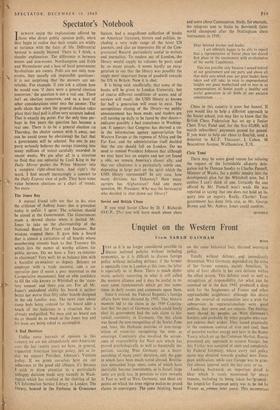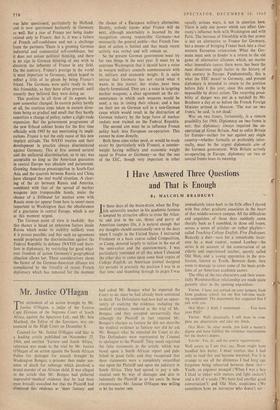Unquiet on the Western Front
From. SARAH GAINHAM
DONN
JUST as it is no longer considered possible to discuss national policies without including economics, so it is difficult to discuss foreign policy without including defence; if the former is especially true in London at this time, the latter is especially so in Bonn. There is much diplo- matic activity restarting in what is still called the western alliance and it may be useful to re- state some fundamentals which get lost some- times in daily events and comments upon them.
Since it existed, the Federal Republic's foreign affairs have been dictated by 1945. That historic moment led to the claim in the 1949 Constitu- tion that the part of Germany which,could freely elect its government had the sole claim to his- torical continuity in Germany. On this claim was based the non-recognition of the Soviet Zone and. later, the Hallstein doctrine of non-recog- nition of countries recognising the zone as sovereign. Continuity also involved the accept- ance of responsibility for Nazi acts which has proved psychologically as well as financially im- portant, starting West Germany on a heart- searching of many years' duration, only the gaps in which have been much noted abroad. Restitu- tion demanded large sums, some of which have inevitably become investments, as in Israel; large sums are paid, too, in pensions to state servants in East as well as West Germany, and these are points on which the zone regime makes no proud claims to sovereignty. The same thinking, based
on the same historical fact, dictated westward policy.
Totally without defence and immediately threatened, West Germany depended on the arms of her former enemies, mainly American, in spite of later efforts in her own defence within the allied system. This defence need, as well as. recognition of responsibility for what can be summed up in the date 1945, produced a deep wish for the forgiveness of France and other approachable neighbours; although this desire and the reversal of nationalism into a wish for submersion in supranationalism were good politics, they were and are sincere. The feelings were shared by peoples on West Germany's borders and probably by other peoples who can- not express their wishes. They issued practically in the common control of iron and coal, then of peaceful nuclear energy and later in the Rome Treaty which set up the Common Market. Russia prevented any approach to eastern Europe, but this Verbot was accepted at once and completely by Federal Germany, whose every real policy move was directed towards gradual west Euro- pean unification, while east Europe was in prac- tice almost ignored until the last year or so.
Looking backward, an important detail is clear which is rarely mentioned for many reasons, including its being taken for igranted: the longed-for European unity was to be led by France as primes inter pares. This assumption was later questioned, particularly by Holland, and is now questioned hesitantly in Germany as well. But a fear of France not being leader existed only in France; that is, it was a failure of French self-confidence and not a challenge from the partners. There is a growing German industrial and commercial self-confidence, but it does not colour political thinking, and there is no sign in German thinking of any wish to diminish the influence of France in any field. On the contrary, France's prestige in the world is most important to Germany, which hoped to reflect a little of its gleam by being France's friend. The Germans were quite ready to buy this friendship, as they have often proved; until recently they believed they were doing so.
This position in all three of its aspects has now somewhat changed. In eastern policy hardly at all, the cautious steps taken in eastern direc- tions being so gradual and small that they hardly constitute a change of policy, rather a,slight trade expansion. But the government programme of the new Erhard cabinet broke for the first time officially with 1945 by not mentioning its impli- cations. France is not the only cause of this new implicit attitude. The NATO treaties and their development in practice always discriminated against Germany. This at first seemed natural and the unilateral discrimination, so to say, was acceptable so long as the American guarantee in central Europe was absolute and paramount. Growing American preoccupation in South-East Asia and the quarrels between Russia and China have changed the real world' situation. A clear- ing of the air between Russia and America, combined with fear of the spread of nuclear weapons into irresponsible hands, make the chance of a Stillstand for nuclear arms with Russia seem (or appear from here to seem) more important to Washington than the absoluteness of a guarantee in central Europe, which is not at this moment urgent.
The German point of view is twofold: that this chance is based on unknown factors Inside Russia which make its stability unlikely even if it proves possible; and that such an agreement would perpetuate the discrimination against the Federal Republic in defence (NATO) and there- fore in diplomacy, by restricting for good what- ever freedom of action Germany's geographical situation allows her. These considerations about the future of the German-American alliance are complicated by the frivolity of recent French diplomacy which has removed for the moment the chance of a European military alternative. Bluntly, nobody knows what France will do next, although uncertainty is lessened by the recognition among responsible Germans—not necessarily the general public—that French free- dom of action is limited and that much recent activity was verbal and will remain so.
So the present German government must try for two things in the next year. It must try to convince Washington that it should have a voice in western military councils commensurate with its military and economic weight. It is quite untrue that Germany has not stated what it wants in this matter; her wishes have been clearly formulated. They are: a voice in targeting nuclear weapons; a clear agreement on the cir- cumstances in which such weapons would be used; a say in timing their release; and a ban on their use on German soil in a non-German cause which would result in the destruction of German industry by the large force of nuclear rockets now trained on the Federal Republic.
The second aim must be to influence French policy back into European co-operation. This cannot be done directly.
Both these aims either need, or would be made easier by (particularly with France), a counter- weight having military and economic weight equal to France or Germany—so that the rest of the EEC, though very important in other equally serious ways, is not in question here. There is only one power which can affect Ger- many's influence both with Washington and with Paris. The increase of friendship with that power is 'not an alternative to France for Germany, but a means of bringing France back into a clear western European orientation. What the Ger- mans must seek to hinder is a return to the old game of alternative alliances which, no matter what immediate causes there were, has been the most disastrous single factor in the history of this century in Europe. Fundamentally, this is what the EEC meant- to Germany, and present diplomacy is intended to return to the position before July 1 this year, since this seems to be impossible by direct action. The recurring possi- bility of danger was put in a nutshell by Mr. Brezhnev a day or so before the French Foreign Minister arrived in Moscow. 'The war on two fronts,' he said, 'is not dead.'
War on two fronts, fortunately, is a remote possibility for 1966. Diplomacy on two fronts is not; that diplomacy always required the co- operation of Great Britain. And to enlist Britain for Europe—neither for nor against any single country—whether formally or preferably infor- mally, must be the urgent diplomatic aim of the German government. With Britain actively co-operating in Europe, diplomacy on two or several fronts loses its meaning.







































 Previous page
Previous page